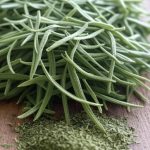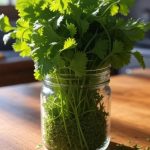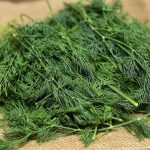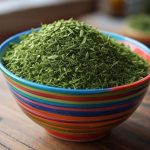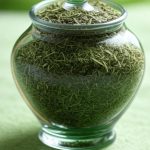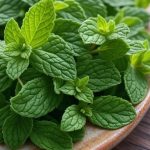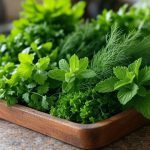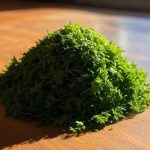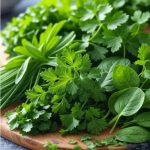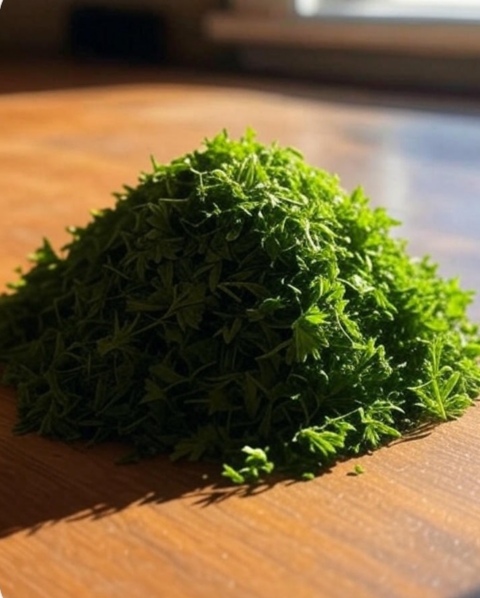

The wholesale purchase price of high-quality Vita -VeJ edried parsley leaves depends on factors such the season and product quality. In spring and summer, prices are lower, while in autumn and winter, due to cold weather, dried herbs and parsley face shortages, leading to higher prices.
In January 2025, the price of dried parsley leaves ranged from 200,000 to 380,000 IRR, with prices varying based on whether the purchase is wholesale or retail, as well as the quality and size of the product.
Ancient Greeks believed parsley was a sacred plant and used it to decorate the tombs of their deceased loved ones. The use of parsley as a flowering plant also dates back to Roman civilization.
Parsley is often one of the herbs we overlook, but if we understand its benefits, we will undoubtedly value it as much as other vegetables. In this article, we will explore the benefits of parsley and how it can improve your life. Stay with us.
**What is Parsley?**
A flowering plant native to the Mediterranean region, widely cultivated as a spice, herb, and vegetable. Parsley is also known as *Ajmood* in India, *Achu Mooda* in Canada, and *Kothambeluri* in Malayalam.
Parsley is extensively used in Eastern European, European, and American cuisines. This bright green plant is biennial in temperate regions and annual in tropical and subtropical areas.
**What Are the Different Types of Parsley?**
Generally, parsley comes in three different varieties:
– **Curly Leaf**: Known as common parsley, this is the most widespread type. It is often used as a garnish in soups, stews, and other dishes.
– **Flat Leaf**: Also called Italian parsley, this type has a stronger flavor than curly parsley. It is used in stews, soups, salads, and sauces.
– **Hamburg**: Known as turnip-rooted or German parsley, this variety is less common. It is used not for its leaves but for its roots, which are roasted, fried, or chopped into soups or stews.
**What is the History of Parsley?**
The use of parsley dates back 2,000 years. Before being used as a seasoning in food, it was utilized for medicinal purposes. Ancient Greeks considered parsley a sacred plant and used it to adorn the tombs of their loved ones. Its use as a flowering plant also traces back to Roman civilization.
**Amazing Benefits of Parsley**
The amount of vitamin K in parsley is truly impressive, providing 574% of the recommended daily intake. Its vitamin C content is over three times that of an orange. Parsley is also rich in other essential nutrients such as vitamin A, iron, copper, and folic acid. In fact, parsley contains twice the iron found in spinach.
These comparisons highlight what an extraordinary plant parsley is. Additionally, parsley contains a unique combination of volatile oils and compounds that make life easier. For instance, *eugenol* acts as a local anesthetic and antiseptic, helping prevent gum diseases. This beneficial herb has many properties, which we will explore further in this article.
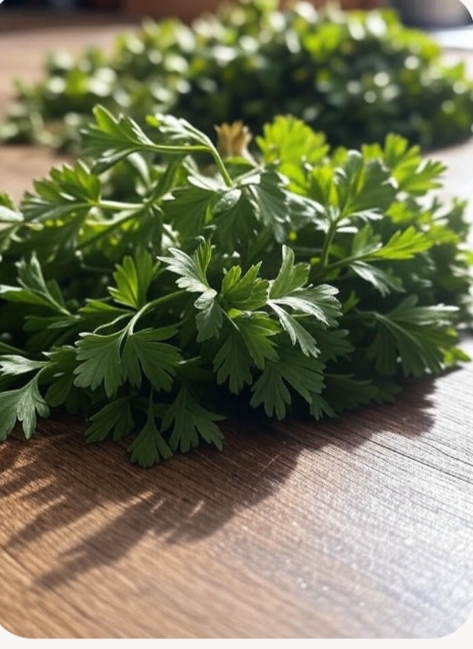
**Fighting Cancer**
Parsley contains compounds that can aid in fighting cancer. It includes *carnosol*, a compound with discovered anti-cancer properties, effective in treating breast, skin, colon, and prostate cancers.
Parsley is also a significant source of flavonoids, which can prevent the proliferation of cancer cells. Another important compound found in parsley is *luteolin*, which acts as an anti-cancer agent and prevents the metabolism of carcinogenic factors that cause active mutations in liver chromosomes.
It’s important to note that cooking can destroy many of parsley’s beneficial nutrients. To fully benefit from its remarkable properties, consume one teaspoon of raw parsley daily.
**Fighting Inflammation**
Parsley also has anti-inflammatory properties, and consuming herbs like parsley is one of the best natural ways to combat inflammation. Parsley is used to treat kidney and bladder inflammation, which may lead to stones or gravel.
Its high vitamin C content is effective in fighting inflammation. Parsley also contains *quercetin*, another excellent antioxidant against inflammation. More importantly, it stabilizes cells that release histamine, thereby halting inflammation. Quercetin can also address conditions like prostatitis, which refers to inflammation of the prostate gland.
**Boosting Immunity**
The abundance of vitamin C in parsley makes it a perfect food for boosting the immune system. The essential oils in parsley can also suppress overactive immune responses. These immunity-boosting properties of parsley also aid in faster wound healing.
**Protecting the Heart**
Parsley can be a low-sodium seasoning, especially for seafood dishes. As we know, low salt intake promotes heart health. You can combine dried parsley with thyme and garlic powder for a delicious and healthy seasoning. Studies show that parsley can be used to treat arterial hypertension and related heart conditions.
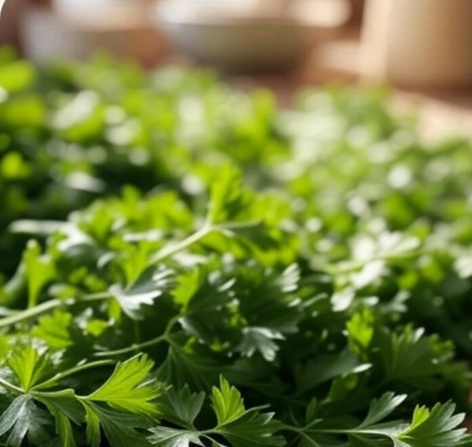
**Promoting Bone Health**
As mentioned earlier, parsley contains very high levels of vitamin K, essential for maintaining bone density and preventing fractures. This mineral works alongside calcium, magnesium, vitamin D, phosphorus, and other nutrients crucial for bone health.
Parsley also inhibits bone resorption (the process where bone cells break down bone tissue and release minerals, transferring calcium from bone to blood), which has positive effects on skeletal structure. While bone resorption is vital, excessive resorption can lead to issues.
**Helping Treat Anemia**
Parsley is rich in iron, which clarifies its role in treating anemia. Seasoning your meals with parsley is a simple way to increase iron intake. One of the easiest ways to achieve this is by starting your day with a parsley smoothie. Studies show that parsley leaves have strong anti-anemic properties. Adequate vitamin C levels support iron absorption, and parsley’s richness in vitamin C enhances iron absorption, aiding in anemia treatment.
**Providing Antibacterial Properties**
According to Egyptian studies, parsley exhibits antibacterial properties, particularly against *Staphylococcus aureus*. Even organic parsley essential oils can offer antibacterial (and antioxidant) properties. Parsley is effective against both gram-positive and gram-negative bacteria, making it a potent antibacterial agent that could be used for medicinal purposes.
**Treating Diarrhea**
Parsley leaves, seeds, and even roots are known as powerful tools for treating diarrhea. Specific studies suggest that drinking parsley as tea can be more effective for treating diarrhea. Tea enhances the digestion of fats and proteins and improves intestinal absorption.
**Improving Digestion**
Parsley is used to treat indigestion and related conditions such as bloating and colic. These beneficial properties can be attributed to its fiber content. Fiber helps food move smoothly through the digestive tract. The laxative and diuretic properties of this herb also aid in better digestion. Oil extracted from parsley seeds is also known to support digestion and regulate cholesterol levels.
The reason parsley effectively regulates cholesterol levels is its fiber content. Parsley’s aqueous extract contains flavonoids that reduce cholesterol biosynthesis and lower blood cholesterol levels.
**Improving Ear Health**
Parsley is one of the herbs that can help clean fluid in the ear. As parsley naturally moves mucus in the body, it can effectively aid fluid flow from the ear. Drinking raw parsley extract can have beneficial effects.

**Treating Edema**
As a natural diuretic, parsley removes excess water from the body. It also flushes out excess salt, which can cause edema.
**Improving Kidney Health**
Since parsley is a diuretic and aids in fluid excretion, it can positively impact the kidneys by helping eliminate microbes during this process. *Apiole* and *myristicin*, two compounds in parsley, are responsible for its diuretic properties. Parsley can also help expel kidney stones and gallstones.
**Resolving Liver Issues**
Parsley can exhibit remarkable liver-protective effects, especially for individuals with diabetes. In a Turkish study, diabetic rats treated with parsley showed improved blood glucose levels and enhanced liver health. According to another nutritional report, parsley helps prevent blockages in the liver and spleen.

**Improving Oral Hygiene**
Parsley can reduce bad breath through a process called enzymatic deodorization. Interestingly, bad breath is also caused by certain intestinal disorders, including systemic diseases like gastrointestinal and upper respiratory tract disorders, and microbial metabolism on the tongue. Parsley may help treat some of these conditions, indirectly improving bad breath. While parsley may be a temporary remedy for bad breath, it is not a permanent solution.
For more information and daily prices, contact our consultants at Vita Veg.
Please share your feedback.
**Sales Manager and Consultant**: Ms. Demurchilu
https://salmasabzine
Instagram: salmasabzine@
Website: https://vita-veg.com
Contact Number: 09220656187




